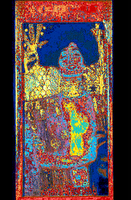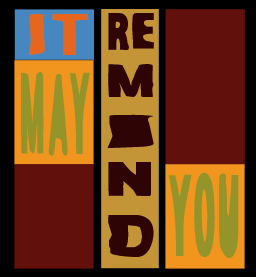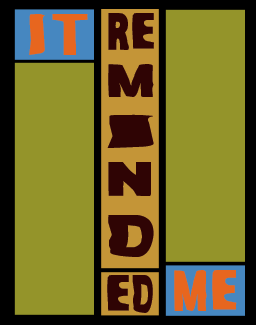"It may remind you . . ." [Cage story / Mondrian]

There's no denying the fact that my appreciation of modern art has a lot of gaps. Mondrian is but one case in point. The above painting, however, is, from my point of view, exceptional (in at least the technical sense of affording an exception to the generality). This makes me realize it's probably the primary colors of most Mondrians I've seen, that I may be reacting against.
 My appreciation for black, white, and unaltered, unfinessed, unbantered, -bartered, -blended, -blimeyed, unmixed, -mottled, -muddled, -muted, un-accented, lacking local variation, lacking green, lacking smudge, lacking thick becoming thin or vice-versa, lacking in twang dialect brush-mush note-bend mote-blend, the moss-less, lichen-less, factory-sealed, untampered, unpampered, un-quaint, un-faint, the jig-, jag-, bump-, scrape-lacking, the unnervingly un-undulant, un-naturalized red and yellow and blue -- my appreciation (for what-I-just-said) would (in fine) appear to have some sense of restriction. But (on the other hand), look at these-here hues (and how they're applied). Now imagine (if you will) Klimt or Rothko in (unblended, unvarying) primary colors. No, don't imagine it. Anyway, where was I?
My appreciation for black, white, and unaltered, unfinessed, unbantered, -bartered, -blended, -blimeyed, unmixed, -mottled, -muddled, -muted, un-accented, lacking local variation, lacking green, lacking smudge, lacking thick becoming thin or vice-versa, lacking in twang dialect brush-mush note-bend mote-blend, the moss-less, lichen-less, factory-sealed, untampered, unpampered, un-quaint, un-faint, the jig-, jag-, bump-, scrape-lacking, the unnervingly un-undulant, un-naturalized red and yellow and blue -- my appreciation (for what-I-just-said) would (in fine) appear to have some sense of restriction. But (on the other hand), look at these-here hues (and how they're applied). Now imagine (if you will) Klimt or Rothko in (unblended, unvarying) primary colors. No, don't imagine it. Anyway, where was I?Agreed, Mondrian's work -- like so much in the realm of painting -- gains appreciably from viewing it live (versus reproductions). The (understated) physical challenge and (pleasingly plain) technical accomplishment of his (it could be said) decidely "unpainterly" paintings is naturally noted. Ah, but I don't have a sense of Mondrian chronology. (Perhaps his unpainterly phase came later; certainly, again, the above painting gives pause.)
Of course he establishes a vocabulary and then works devotedly within its terms. The expressive implications of rectilinear forms are nothing to sneeze at (I'll agree he proves that case, if it needed proving; but then, it's pleasingly proved in a range of ways . . . as slowly I convince myself, but without real enthusiasm).
This is not computer graphics (even if something along its lines could now obviously be arrived at on that road). It seems my problem with Mondrian may be akin to my lack when aface Kandisnsky. (I think there was a time when I appreciated Pollack, but today, it's like the memory of a memory. Motherwell, I might be able to muster, we'll see.) Well let me not go on in this way. One should speak more of what one has reached a liking for. The things that fall thru the sieve, should be allowed to pass. Some other day, the sieve may have grown more fine-meshed, or the particles more substantial, and presto!
 When I read Cage's Mondrian tale, it at once called to mind the voice and image of (the then younger, as were we all) Pameala Z, onstage in a little fashionably unfashionable, quietly sequestered, demimondish venue in the Mission District of San Francisco, circa -- what? -- 1985 or so. She sang a song with the name "Piet Mondrian" repeated several times in it (the line I guess a refrain). It seemed clear enough she liked the guy. Or the sound of his name. Or both. (The liking was vaguely infectious.) This song mentioning Mondrian, I can almost remember some words . . . was this "Cultured Pearls"? No, I think not. Though that was probably in the same program.
When I read Cage's Mondrian tale, it at once called to mind the voice and image of (the then younger, as were we all) Pameala Z, onstage in a little fashionably unfashionable, quietly sequestered, demimondish venue in the Mission District of San Francisco, circa -- what? -- 1985 or so. She sang a song with the name "Piet Mondrian" repeated several times in it (the line I guess a refrain). It seemed clear enough she liked the guy. Or the sound of his name. Or both. (The liking was vaguely infectious.) This song mentioning Mondrian, I can almost remember some words . . . was this "Cultured Pearls"? No, I think not. Though that was probably in the same program.I was tempted (on verge of writing this story) to email Pamela and ask after the lyrics (Google is good, but not that good). But the nature of these ruminations seems to require a strong dose of the impromptu. Planning to write one would just not do. One sits and writes, and that's all there is to it. So we lose the verbatimity [though gaining the neologism thereof], but we keep within the feeling of the form. In some respects, the verbatim is overrated. Memory and its lacunae -- there are things to be said for it.
Well, let us consider the text at hand. Cage's story 194 reads in its entirety (leaving aside blank spaces) thus:
David Tudor and I went to Hilversum
in Holland to make a
recording for the Dutch radio.
We arrived at the
studio early and there was some
delay. To pass
the time, we chatted
with the engineer who was to work
with us. He
asked me what kind of music he was
about to record.
Since he was a Dutchman
I said, “It may
remind you of the work of Mondrian.”
When the session was finished
and the three of us were leaving
the studio, I
asked the engineer what he
thought of the music we had
played. He
said, “It reminded
me of the work of Mondrian.”
 With many of these stories of Cage's, one could go so far as to say their subject is as much the laconic utterance (and its resonance or spread of implication) as the narrative substrate in which this locanicality inheres. The art of elision . . . but what is elided? That's the fertile question.
With many of these stories of Cage's, one could go so far as to say their subject is as much the laconic utterance (and its resonance or spread of implication) as the narrative substrate in which this locanicality inheres. The art of elision . . . but what is elided? That's the fertile question.After writing all the above, it belatedly dawned on me: hey, I suppose Mondrian might have been Dutch. (I was shamefully inattentive to the telltale phrase, "Since he [the engineer] was a Dutchman....") And well yes, Mondrian too was Dutch. Cage's story is set in Holland. There's the slightly tricky problem of Holland vs. The Netherlands; but however one nuances regional/historical borders, basicaly Mondrian was a countryman of the sound-guy's. This has relevancy, sure; but only some. Stretching beyond, is something else, a few somethings.
Mondrian has a sparity, doesn't he? A sense of form that's in some ways akin to the organic -- but at a very curious remove, rather as thought can seem, in its abstractive flights, far removed from roughshod terrain.
 Speaking of the Netherlands calls to mind the filmmaker Mani Kaul and the novelist Cees Nooteboom. I recommended the latter to the former (when discussing works of poss. interest for adaptation). My fave so far is Nooteboom's The Following Story (1991), a deep novella of life and death. These days I'm reading Jose Saramago, the Portugese novelist par excellence. A case could be made that Nooteboom shares some qualities with Saramago -- particularly in this story. I guess it's no accident that this tale is partly set in Lisbon. But don't now get me talking about Fado, or there'll be no near end to it. Do, however, consider tracking down and watching Wim Wenders' Lisbon Story (1994). The notable Mani Kaul we'll discuss another day. I've yet to see his DV-film I Am No Other (2002). Likewise Uski Roti (1969) . . .
Speaking of the Netherlands calls to mind the filmmaker Mani Kaul and the novelist Cees Nooteboom. I recommended the latter to the former (when discussing works of poss. interest for adaptation). My fave so far is Nooteboom's The Following Story (1991), a deep novella of life and death. These days I'm reading Jose Saramago, the Portugese novelist par excellence. A case could be made that Nooteboom shares some qualities with Saramago -- particularly in this story. I guess it's no accident that this tale is partly set in Lisbon. But don't now get me talking about Fado, or there'll be no near end to it. Do, however, consider tracking down and watching Wim Wenders' Lisbon Story (1994). The notable Mani Kaul we'll discuss another day. I've yet to see his DV-film I Am No Other (2002). Likewise Uski Roti (1969) . . .It doesn't take special acuity to note that (from one angle), the topic of this story of Cage's is the limitation of language. The sound engineer (unfamiliar with the composer's work) is offered one term of association, a single reference-point for concept, figuration, comparison: one trope, one hook, one window-frame. One thing to be reminded of.
The one point of reference proves sufficient -- or is it merely that no fuller vocabulary is available?Remind me what remind means
I'm of a mind to learn
one thought links to another
the mindful may discern
one needs to mind one's manners?
one minds the store at times
one doesn't mind if of a mind
and minded for such rhymes
now music reminding of painting
(like Cage of Piet Mondrian)
is possible when one's acquainting
a dusk that's reminding of dawn
or a hat that's reminding of shoes
or a dream that's reminding of news
I said, “It may
remind you of the work of Mondrian.”
He said, “It reminded
me of the work of Mondrian.”
 This is symmertry, a prognostication and its fulfillment, a hunch and its realization, a suggestion that's mirrored in the reply. From one angle, the answer verges on the inarticulate. From another angle, it says all that need be said.
This is symmertry, a prognostication and its fulfillment, a hunch and its realization, a suggestion that's mirrored in the reply. From one angle, the answer verges on the inarticulate. From another angle, it says all that need be said.There's also the question of memory. It seems on the verge of slight possibility that the engineer, in giving his answer, did not remember the earlier exchange. He had (one may say) internalized the association. When asked for his impression, he spoke naturally (or as it seems to us, naively), disclosing the association he had pondered, possibly forgetting its extrinsic source.
==========
Perhaps the man was anyway besotted with Mondrian. "Everything reminds me of the Beloved," as the Persian poets say. Ram Dass (whom we once knew as Richard Alpert) spoke a nice riff on this ubiquitous theme --
Each morning when I wake up, I say good morning to the Buddha, to my guru, and to the other holy beings there. But I find that it’s with a different spirit that I say, “Hello Mr. Politician.” I know it sounds like a funny thing to do, but it reminds me of how far I have to go to see the Beloved in everybody. Mother Teresa has described this as “seeing Christ in all his distressing disguises.” When I realized that Mother Teresa was actually involved in an intimate love affair with each and every one of the poor and the lepers she was picking up from the gutters in India, I thought to myself, “ That’s the way to play the game of love.” And that is what I have been training myself for the last past quarter century: to see and be with the Beloved everywhere.Supposing the engineer wasn't merely being polite (and saying what he thought was expected of him), let us posit he was reminded, by Cage's music, of Mondrian. The question unanswered (a surprising question to which Ram Dass's rumination gives rise) is whether, however, he was seeing Mondrian in one of his "distressing disguises." But this thought tangents into a thin, receding line.
Perhaps if one goes deeply into Mondrian, the sense of space between dark lines resembles the sense of silence between sounds, in much of Cage's work.
From another angle, any artwork may naturally remind of another artwork. That music, painting, and poetry (for instance) carry the cargo of one another, is a kind of secret nestled in these arts, where everything poses as translation.
There's also the link of austerity -- austerity in Cage and Mondrian.
This merely reels out a few elements from the tale. Every time one draws out a thread, one errs, yes? Ramakrishna never tired of saying (to paraphrase): the tongue is impure. Hence truth, no sooner expressed in words, gets tainted.
Taint and tint could be cognate. Imperfection notwithstanding, utterance has its colorful charms.
===========
This is my Cage story rumination no. 5


1 Comments:
I emailed Pamela Z, and she came back with this delightfully detailed backgrounder.
[QUOTE]
Yes that was a very long time ago. I'm honored that you remember such an early performance of mine. By the way, I will be performing in your neck of the woods next spring. (Check May 2007 in my calendar of events)
Alrighty, here's the skinny:
You were, in your distant memory, concatenating the lyrics of two different songs. Both were quite likely performed. One song was called "The Mondrian" and the other had the grammatically controversial title: "Pearls, the Gem of the Sea".
The Mondrian started this way:
Piet Modrian was a painter
Big black lines, a few white squares
and every now and then
a square of blue or red
So beautiful,
so clear...
It went on to describe an imaginary new dance craze called "the Mondrian" in which one does a series of steps that form squares on the floor. The chorus was "Come on, come on, do the Mondrian!"
This song was actually one of the few "cover" tunes I was performing at the time. It was written by a friend of mine Mark Gunniun, who was performing locally under the name "Junglebook" at that time. (Don't know what ever became of him. Hmm....Google?) Mark was known for doing solo new music and performance art using only his voice and drums. I used to perform his song using a pair of giant drum sticks (and later hammer handles) which I clicked together to form a vocal and percussion digital delay loop.
The other song you are thinking of was my own composition "Pearls, the Gem of the Sea". Its chorus was:
Pearls, cultured pearls!
They go to the opera
They support the ballet
Pearls, cultured pearls!
They watch Masterpiece Theatre
and Parle le Français
The verses of the song were spoken and told the story of Mikimoto and how he pioneered the process of culturing pearls by placing an irritant between the body and the shell of an oyster and then sending divers down to retrieve these oysters once the pearls were mature. (The spoken verses were taken directly from found text- a long, complex sales pitch I used to have to give in a Jewelry store job I once had.)
Thought you'd want to know... (too much information?)
Cheers!
Pamela
[UNQUOTE]
Not too much info! good info!
cheers,
d.i.
Post a Comment
<< Home